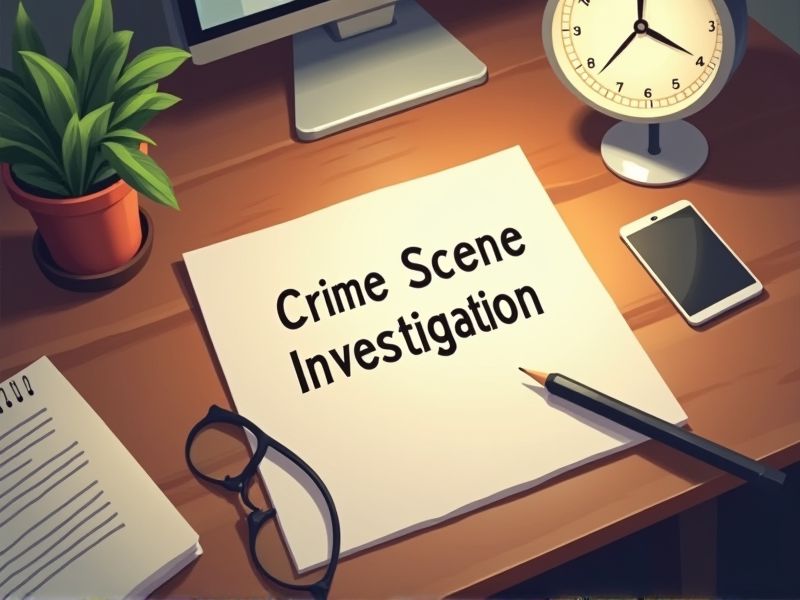
Crime scene investigators play a crucial role in forensic science, and certifications ensure they possess the necessary skills and knowledge to handle complex case scenarios. Certifications provide standardization in training, which leads to improved accuracy and reliability in evidence collection and analysis. Having specialized certifications can also enhance an investigator's credibility, making their findings more persuasive in legal contexts. These are some essential certifications that a crime scene investigator may require.
IACIS Certified Crime Scene Investigator (IACIS-CCSI)
Obtaining the IACIS Certified Crime Scene Investigator (IACIS-CCSI) credential enhances an investigator's credibility due to rigorous standards and comprehensive testing, reinforcing proficiency in forensic methodologies. Extensive training in the certification process ensures standardized procedures and adherence to legal requirements. The certification provides ongoing professional development, keeping investigators updated with the latest advancements and techniques in crime scene analysis. Recognition by peers and agencies often leads to career advancement opportunities and increased trust within the criminal justice system.
IAI Certified Crime Scene Analyst (IAI-CCSA)
Obtaining the IAI Certified Crime Scene Analyst (IAI-CCSA) certification enhances a Crime Scene Investigator's credibility, demonstrating proficiency and commitment to the field. The certification ensures individuals are updated with the latest techniques and standards, essential for accurate evidence collection and analysis. Certified professionals tend to have better problem-solving skills, crucial for deciphering complex crime scenes. The certification can lead to career advancement opportunities and recognition among peers and employers.
Certified Forensic Evidence Technician (CFET)
Certified Forensic Evidence Technicians ensure the correct collection and preservation of evidence, which is crucial for maintaining its integrity in court. Properly trained technicians reduce the risk of contamination or loss that could jeopardize a case. They offer specialized knowledge in evidence processing, helping Crime Scene Investigators focus on broader crime scene analysis. Their expertise in documenting evidence supports building a robust case, increasing the chances of successful prosecution.
National Crime Scene Investigation Certification (NCSIC)
The National Crime Scene Investigation Certification (NCSIC) ensures that crime scene investigators possess the essential skills and knowledge required for meticulous evidence handling. Enhanced credibility and trust in court proceedings arise when certified professionals are involved, impacting prosecution success rates. NCSIC serves as a standardized benchmark, reducing discrepancies in investigative practices across different jurisdictions. It fosters continued professional development, keeping practitioners updated with the latest advancements in forensic science.
FBI Crime Scene Investigation Training Certification
FBI Crime Scene Investigation Training Certification equips investigators with standardized methodologies critical for accurately analyzing and processing crime scenes. This certification ensures that investigators adhere to legal and ethical standards, minimizing the risk of evidence contamination or loss. These trained investigators are more adept at collaborating with federal, state, and local law enforcement agencies, enhancing overall investigative efficiency. With certification, investigators have credibility in court, strengthening the reliability of their testimony and the admissibility of evidence.
State-Certified Crime Scene Investigator Credential
Obtaining a State-Certified Crime Scene Investigator Credential ensures adherence to standardized protocols and best practices in the field. Certification enhances professional credibility, leading to greater trust from law enforcement agencies and the legal system. Structured training through certification reduces procedural errors, improving the accuracy of evidence collection and analysis. Certified investigators demonstrate a higher level of expertise, increasing the likelihood of solving cases and securing justice.
Certified Crime Scene Photographer (CCSP)
Certified Crime Scene Photographers (CCSP) play a pivotal role as their expertise ensures accurate documentation of crime scenes, which is vital for investigations and legal proceedings. Properly photographed evidence can lead to better analysis, ultimately supporting stronger cases in court. Crime scene photographs provide a permanent visual record, assisting investigators in reconstructing events and understanding the sequence of actions. Their specialized training equips them to handle challenging environments, ensuring that all details are captured in a manner consistent with forensic standards.
Digital Evidence Collection and Analysis Certification (DECA)
The increasing reliance on digital technology in criminal activities necessitates specialized training, making the Digital Evidence Collection and Analysis Certification (DECA) crucial for informed investigative work. Mastery in digital evidence handling enhances a Crime Scene Investigator's ability to preserve, analyze, and interpret critical data from electronic devices. Law enforcement agencies are placing greater emphasis on cybersecurity, and DECA equips investigators with the skills to adapt to these evolving demands. Proficiency in digital forensics gained through DECA ensures investigations adhere to legal standards, minimizing risks of evidence dismissal in court.
Certified Fire and Explosives Investigator (CFEI)
Crime scene investigations involving fires or explosions require specialized expertise; hence, a Certified Fire and Explosives Investigator (CFEI) is needed to accurately determine the cause and origin. The complex nature of these incidents often presents challenges in distinguishing between accidental and intentional events, making CFEIs crucial in understanding potential criminal activity. Their training ensures evidence is correctly interpreted and preserved, leading to precise legal outcomes. Hiring a CFEI increases the credibility of investigation findings, as their certification demonstrates validated competency in this specialized domain.
Courtroom Testimony and Expert Witness Training Certification
Courtroom Testimony and Expert Witness Training Certification equips a Crime Scene Investigator with the necessary skills to present evidence clearly and confidently in legal settings. Crime Scene Investigators often face intricate legal scrutiny, requiring them to understand courtroom procedures and protocols thoroughly. Without such certification, their credibility as expert witnesses could be questioned, potentially undermining the integrity of the evidence presented. Effective communication of forensic findings in court directly impacts the outcome of trials, making this certification crucial for the justice process.
Summary
When you gain certifications as a Crime Scene Investigator, your expertise and credibility in the field significantly increase. Certifications often result in better job opportunities and potentially higher salaries due to recognized skills. With advanced training, you will likely conduct more efficient and accurate crime scene analyses. Consequently, this can lead to improved case resolutions and heightened trust from your peers and superiors.
